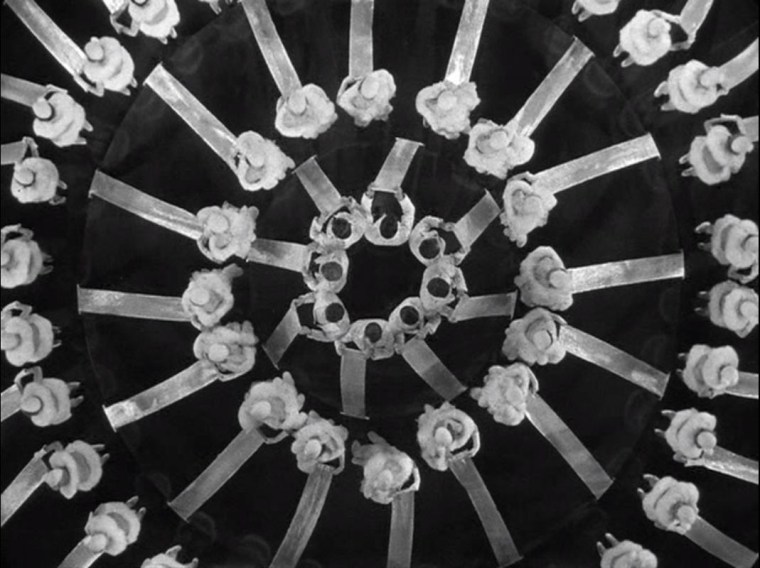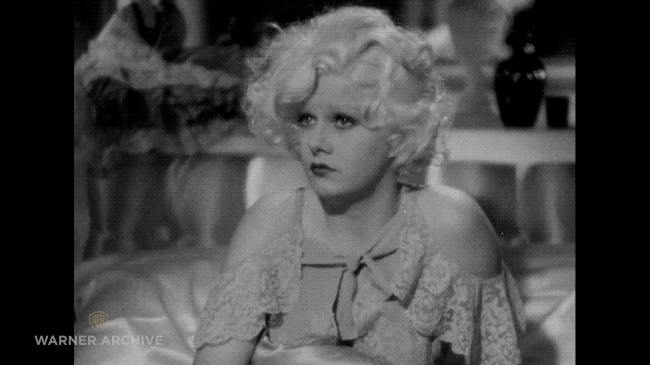
All together now! Just a little dance number à la Busby Berkeley. Image: Things Left Undone
In an effort to be Smarter, we’ve been reading Dancing in the Dark: A Cultural History of the Great Depression by Morris Dickstein.
Dickstein’s book is filled with all sorts of Thoughts and Information on the 1930s. One example is an analysis of Depression-era films, specifically the Oscar-nominated musical, 42nd Street (1933).
Here are Dickstein’s conclusions:
Until [the end]…nothing goes well, but this is just the point. The show does go on, and the show itself is the main success story, embracing the individual triumph of everyone who made it. This is a perfect thirties paradox: success in show business is individual, but the overall triumph…belongs to the ensemble, the collective effort. (p.239)
Now, this description might make it seem like 42nd Street is a thinly-disguised lecture on Getting Along With Others, but it’s not. It’s a real treat to watch. It has interesting characters, witty lines, gorgeous Orry-Kelly costumes and Busby Berkeley choreography.
A perfectly-cast Warner Baxter is Julian Marsh, a gruff and stressed-out director of Broadway plays, whose “home” theatre is the 42nd Street Theatre. However, the term “42 Street” is also a reference to the New York theatre district. Even though the action takes place with one theatre company, we understand this to be symbolic of the industry.
Baxter’s character learns that he has a serious illness, and realizes – for financial reasons – he needs to direct one last Big Show before his health forces him to retire.
Baxter’s determination to have a hit show is propped up by its famous lead actress (Bebe Daniels), who ensures the play’s financial stability by befriending the rich producer (Guy Kibbee) while carrying on a secret romance with her boyfriend (George Brent). But when she breaks her ankle, a rookie cast member (Ruby Keeler) is enlisted to take her place onstage.
Yes, this sounds like a cliché plot, but it feels authentic in 42nd Street because the script never lets us forget how desperate the early 1930s are – or how desperate Baxter himself is.

Warner Baxter (right) begs Ruby Keeler not to fail. Image: indiewire.com
Just before Keeler is to make her first onstage appearance at the premiere, Baxter pulls her aside for some last-minute words. He’s not giving her a pep talk; he’s pleading with her to be triumphant.
“You listen to me, and you listen hard,” he says, fiercely squeezing her arms. “Two hundred people, 200 jobs, $200,000, five weeks of grind and blood and sweat depend on you. It’s the lives of all these people who’ve worked with you… You can’t fall down. You can’t. Because your future’s in this, my future, everything all of us have is staked in you.”
(No pressure!)
It’s an unexpectedly heart-warming film. Competition in the theatre is tough, but a wise-cracking chorus member (Ginger Rogers) takes the novice Keeler under her wing early in the film. “Stick with us, kid,” she says kindly, “and you’ll come in on the tide.” As Dickstein points out, the script promotes a working together for the Greater Good. There is no success unless all succeed.
42nd Street was the first Busby Berkeley musical from Warner Bros., but all is not glamour. The film makes us aware how much work goes into a Broadway production; cast members are actually shown sweating. But this draws us into the narrative, so when Warner Baxter begs Ruby Keeler not to fail, he’s begging for all of us.
If you’re looking for a film that pulls you into the spirit of the early 1930s, you’ll want to check out 42nd Street.
42nd Street: starring Warner Baxter, Bebe Daniels, George Brent. Directed by Lloyd bacon. Written by Rian James & James Seymour. Warner Bros, Pictures and Vitaphone, 1933, B&W, 89 mins.












Ruth, dear pal, 42nd Street sure has changed over the years – the glamorous version of the 30s, to the seedy underbelly version of the 70s – 80s, to the polished-up tourist trap of today.
I recall an SNL parody where a young doe-eyed dreamer came to the modern (of the time) 42nd Street and got a job at a strip joint.
LikeLike
Yes, it looks like the area has undergone a lot of transformations…some good, some bad, as you pointed out. I was there some years ago & would love to go back.
LikeLike
I have always loved books or movies that take place in the 30’s. There is something about surviving a depression that is remarkable to me. I am so curious about how they did it. This movie sounds like one I need to watch. I loved your insight on the fact that in the movie, the play was kind of a metaphor about the entire industry at the time. I will be thinking about that when I watch it. The book sounds really interesting. I should probably read it so I can get smarter, too! 🙂 Thanks, Ruth!
LikeLike
The book is interesting, although a bit dry in places. But the author has fascinating things to say about the films of the period. As for Warner Baxter in this film, I thought he was perfect. I’ve seen him in other movies & was lukewarm towards him, but I loved him in this.
LikeLike
I so agree with you about Warner Baxter — perfect in this with his melodramatic style. I think we have to remember that at the time it came out, it was not a cliché kind of movie. It has become that way because of ensuing years. I also love to watch Ginger Rogers, to see her evolve from a hard-livin’ dame to the funny and ethereal dancer with Astaire. Nice article!
LikeLike
Yes, good point about Ginger Rogers’ evolution from a wise-cracking gal to the witty dancer paired with Fred Astaire. I love her in these early roles.
LikeLike
What’s not to appreciate? It’s Warner Brothers, it’s the depression….fits like a hand in a glove. Morris Dickstein was one of my professors many, many moons ago. I’d like to take a swing at that book – just for old times sake.
LikeLike
Morris Dickstein was your prof? Get out! He sounds like a brainiac, and I bet you have to be a real smarty pants to get through his class. Good on you!
LikeLike
You are… This is… I love this post. I am so glad I found you! (Too pathetic? Actually, “pathetic” is good enough on its own without the “too” in there.) Anyway, seriously love this. It’s fascinating. And, no, I haven’t seen this one, either. Gah! I know. I’m aiming to fix that.
LikeLike
I’m so glad I found you, too! If you ever have the chance to see this film, you MUST. It’s such a treat.
LikeLike
You nailed it. It is the authentic vibrancy that makes “42nd Street” endlessly fascinating.
LikeLike
“Endlessly fascinating” is a perfect description for this film. I hadn’t seen it, ever, until I bought a TCM Busby Berkeley collection in a sales bin a few years ago. What a find!
LikeLike
Hi Ruth, I Love this movie and the book sounds great I will check it out!
if you get a chance you should check out David M. Kennedy’s American People During the Great Depression (not film per se but gives excellent social context)
Excellent post, my dear!😉
LikeLike
I think you’d really enjoy the book because it’s written for smarty-pants like you. Thanks for the tip re: American People During the Great Depression. I just looked it up on Amazon and it sounds like a terrific resource!
LikeLiked by 1 person
Hi Ruth. I couldn’t find another way to contact you, but I wanted to let you know about a blogathon that I’ve just announced for next year. The link is below with more details
https://crystalkalyana.wordpress.com/2015/10/19/announcing-the-remembering-barbara-stanwyck-blogathon/
LikeLike
Sorry, I’ll have to miss this one. 😦 Great idea, though! I’m sure it’ll be great!
LikeLike
No problems Ruth.
LikeLike